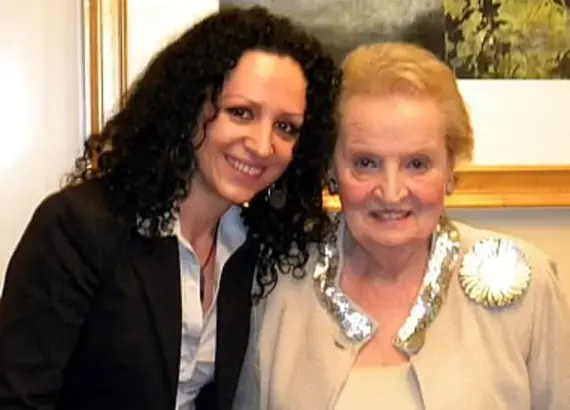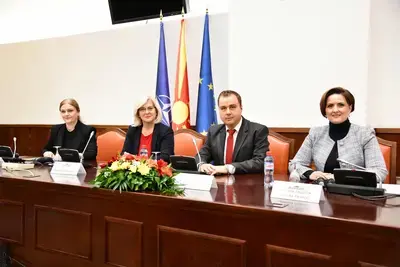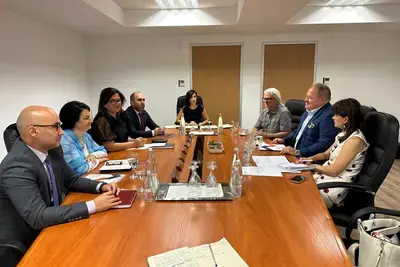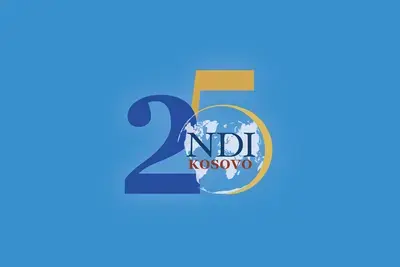
Success Story
Kosovo Fellow to Connect Women Leaders at Local, National Levels
As a young Kosovar Albanian subjected to Slobodan Milosevic’s dictatorship, Aferdita Syla, like tens of thousands of other young people, faced discrimination in education and virtually every other aspect of her young life. Her fundamental rights of citizenship were wholly denied. She had little in the way of realizing her dreams to live a normal life in a normal country.
Milosevic’s rule provoked open conflict in 1999, and an estimated 800,000 Kosovar Albanians were forcibly and violently expelled by Belgrade, fleeing to neighboring countries, where they lived as refugees. At 24, Syla became one of them, escaping to Macedonia.
“I never thought that I’d be able to go back home again,” she said. But she did go back home – in the summer of 1999 after international intervention led to Kosovo’s break from Serbia.
Syla began working with the International Rescue Committee seeking to help people rebuild their lives. Later, she ran a local nongovernmental organization, Gjilan Youth Center, that helped Kosovo’s young people focus on their futures in the aftermath of the turmoil. In 2005 she joined the Kosovo government serving as a political advisor and a liaison with local and international organizations. And in 2008, Syla joined NDI, focusing on women’s issues in a country where women were disproportionally impacted by the decade-long conflict.
“This is the past,” Syla explained. “And I am recounting it so that we can learn from it. The past belongs to history; we must not let it interfere with our present and political future.”
Today, from NDI’s office in Pristina, Kosovo’s capital, she manages the Informal Group of Women Parliamentarians, a caucus of women lawmakers seeking to improve the participation of women in all of the country’s institutions. Although there is a 30 percent quota for women in parliament, and Kosovo’s president is a woman, there are no women political party leaders or women mayors.
 Syla and Amb. Constance Morella
Syla and Amb. Constance MorellaBecause Kosovo is just beginning to build its political institutions, having declared independence in 2008, Syla said now is the time to ingrain gender equality in the Kosovar political tradition. “We want to have real equality,” she said. “Everything is fresh. This is actually to our advantage. That’s why we need to act now: because we are just starting.”
As part of her work with the women’s caucus, Syla developed a proposal to link women parliamentarians with women leaders in local government. She believed that connecting women at these different levels of government would help them build support for better public policy at the grassroots level. Ultimately, Syla hoped the project would improve the image of women politicians and inspire young women to enter politics and see themselves as future leaders of their country.
With that idea she applied for NDI’s Andi Parhamovich Fellowship – and she won. The annual award brings one woman from an NDI in-country office or partner organization to Washington, D.C., for three months to conduct research for a project geared toward building democracy and increasing women’s political participation in her own country. The fellowship is named for Andi Parhamovich, an NDI staff member who was killed in Iraq in 2007.
When the fellowship was first established, NDI Chairman Madeleine K. Albright said, “It is named in her honor, but it was Andi who brought honor to the name and work of NDI, through her dedication and courage.”
For Syla, Albright was instrumental in ensuring Kosovo’s sovereignty and security. When Syla traveled to Washington, D.C., for the fellowship, she was able to meet her hero.
“You can’t imagine how it is to meet the person who was there at the right time to make the right decisions to save your nation,” she said.
In Washington, Syla is researching women’s political participation initiatives in the U.S. and other countries. She is also meeting with women’s groups that focus on increasing women’s political participation at all levels, such as the bipartisan Women Legislators of Maryland, to learn how they function as a group and what mechanisms they use for outreach. The six-month pilot program that results from Syla’s efforts will target five of Kosovo’s 37 municipalities and connect women across party and ethnic lines to focus on local issues.
Building a democracy is a long-term process, Syla said, but, slowly, and by increasing the level of women’s political participation, democracy in Kosovo is becoming a more tangible reality.
Read more:
Published May 4, 2012



